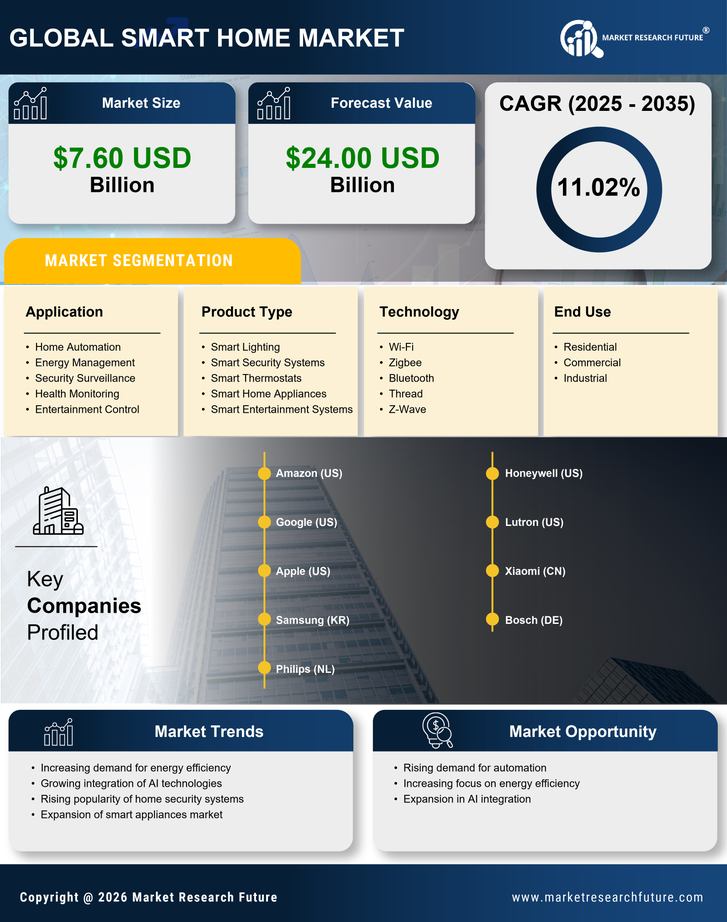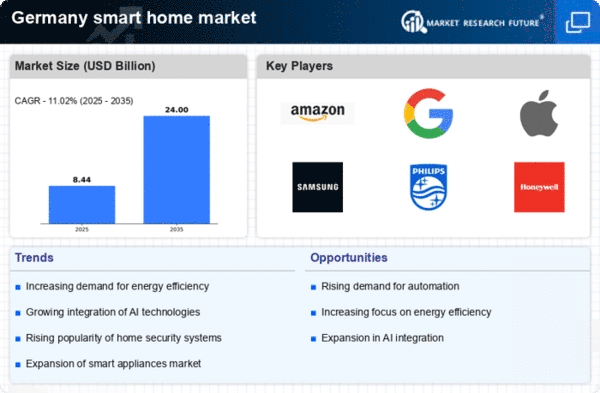Rising Consumer Awareness
The smart home market in Germany is experiencing a notable surge in consumer awareness about the benefits of smart technologies. As individuals become increasingly informed about energy efficiency, convenience, and security, the demand for smart home devices rises. Recent surveys indicate that approximately 60% of German consumers express interest in smart home solutions, reflecting a shift in consumer behavior. This heightened awareness drives manufacturers to innovate and enhance their product offerings, thereby expanding the smart home market. Furthermore, educational campaigns and marketing strategies by companies contribute to this trend, fostering a more informed consumer base. As awareness continues to grow, it is likely that the smart home market will see sustained growth, with consumers actively seeking out solutions that align with their lifestyle preferences.
Government Incentives and Regulations
The smart home market in Germany benefits from various government incentives and regulations aimed at promoting energy efficiency and sustainability. The German government has implemented policies that encourage the adoption of smart technologies, such as subsidies for energy-efficient appliances and tax incentives for homeowners who invest in smart home systems. These initiatives not only stimulate market growth but also align with Germany's broader environmental goals. For instance, the government aims to reduce greenhouse gas emissions by 55% by 2030, which indirectly supports the smart home market. As regulations become more stringent, consumers are likely to turn to smart home solutions that comply with these standards, further driving market expansion. The interplay between government support and consumer adoption creates a favorable environment for the smart home market.
Integration of Renewable Energy Sources
The integration of renewable energy sources into Germany's smart home market is becoming increasingly prominent. As the country aims to transition to a more sustainable energy system, homeowners are seeking smart solutions that facilitate the use of renewable energy. Technologies such as solar panels and energy storage systems are gaining traction, allowing consumers to optimize their energy consumption. Recent reports indicate that around 30% of German households have adopted solar energy solutions, which complements the smart home market. This trend not only supports environmental goals but also offers financial benefits to consumers through reduced energy costs. As the integration of renewable energy continues to evolve, it is likely to drive further innovation and growth within the smart home market.
Growing Demand for Home Security Solutions
The smart home market in Germany is seeing a growing demand for advanced home security solutions. As concerns about safety and security rise, consumers are increasingly turning to smart technologies that offer enhanced surveillance and monitoring capabilities. Recent statistics indicate that approximately 40% of German households are considering the installation of smart security systems, reflecting a shift in consumer priorities. This trend is further fueled by the increasing availability of affordable smart security devices, such as cameras and alarms, which cater to a broader audience. The integration of features like remote monitoring and real-time alerts enhances the appeal of these solutions, making them attractive to consumers. As the demand for security solutions continues to grow, the smart home market is poised for significant expansion.
Technological Advancements in Connectivity
Technological advancements in connectivity play a crucial role in shaping the smart home market in Germany. The proliferation of high-speed internet and the rollout of 5G networks enhance the functionality and appeal of smart home devices. With improved connectivity, devices can communicate seamlessly, allowing for greater automation and control. Recent data suggests that over 70% of German households have access to high-speed internet, facilitating the adoption of smart home technologies. This trend indicates a growing reliance on interconnected devices, which enhances user experience and satisfaction. As connectivity continues to evolve, the smart home market is likely to expand, with consumers increasingly seeking integrated solutions that offer convenience and efficiency.

















